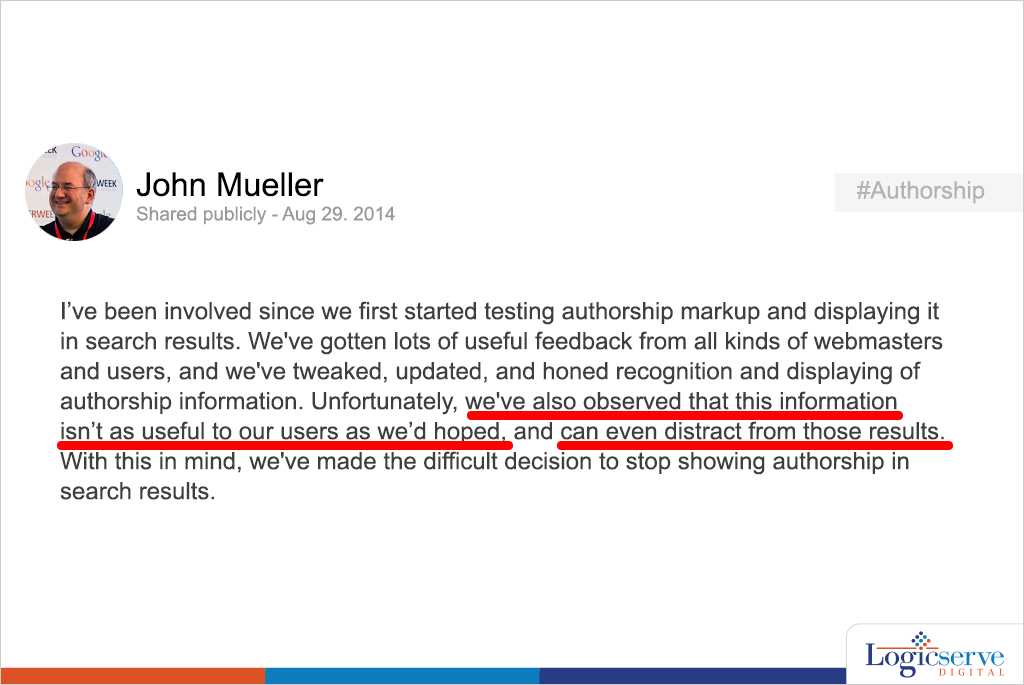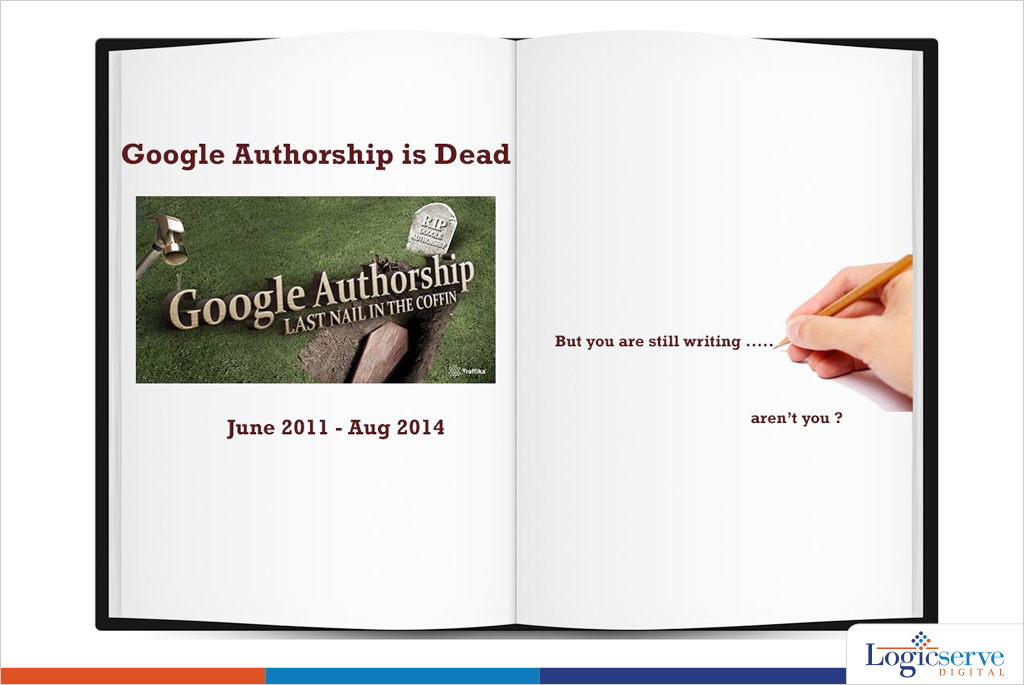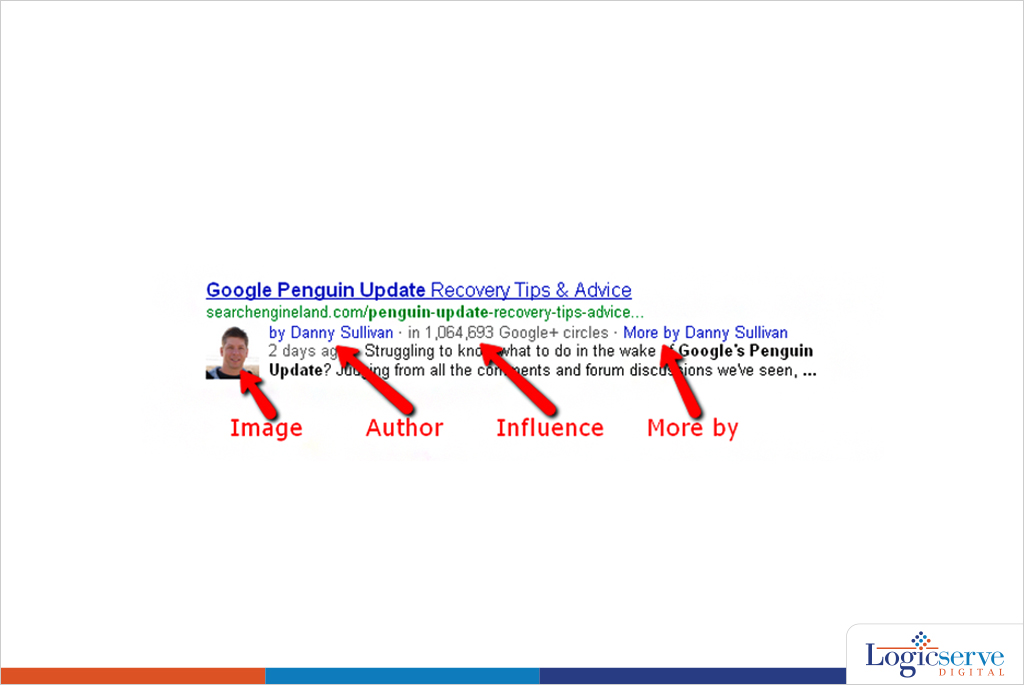So much has been written about Google Authorship in the last week compared to the time this was introduced in June 2011. Had this been the frequency of “authorship posts” before Aug 2014, Google Authorship would not be dead afterall.
It is official – Google Authorship no longer exists.
John Muller’s Offical post on Google Plus
I will be coming back to this statement in a while, so hang on to that thought and read ahead
What makes one an Author?
All of us write, but does that qualify each one of us as an “Author”? Guess not. We write for different reasons. But “To Write” is the only reason for Authors to write for, while the rest of us write for the sake of keeping up with social norms.
Authors invest time, effort, memory & wisdom of the experience gained over the years to come up with a truly original piece of writing, a.k.a “content”. Every content he/she creates is an extension of self, and hence so much dear. So, it is only understandable that due credit reaches the author. Monetary benefits apart, the credit an author looks for is being recognised for his/her work.
- To see her work published (online / offline)
- To have her name associated with the published work (if she is not ghost-writing)
- Thanks to blogs, webzines, and other online publishing options, one is able to publish under their name.
- But that is not all, Status updates on Social media (FB, Twitter, Google+, Linkedin, Quora, the list is endless) is also associated with one’s identity. So technically, is the author of that content as well?
What is Authorship? Is it important?
Associating the identity of the person with content is authorship.
This is a good thing. One gets to claim his writings as his own. Plagiarisers & contents scrappers beware. But then, there are those who cheat and steal content with absolutely no shame whatsoever. So to combat such content piracy, authorship to a work is extremely important
Why did Google launch authorship?
Same reason as above. It is important. (at least, that is what they thought in the june of 2011)
It is important to associate content with its creator, so that when the content is retrieved via search results, the author gets her due credits by seeing her name alongside the title. Given the “visual appeal”, should the author have a photo associated with her profile that also showed up on search results.
How was it received by the online community?
Bloggers, savvy content providers, columnists who wrote across multiple websites were all gung-ho about the authorship initiative. This was an opportunity to establish authority over their written work, which came with the bonus of “likely surge in traffic”. Gives a visual appeal, and it kind of gives that gentle nudge to click the result with author image, compared to one that does not have an image –at least that is what the authors thought would happen.
How many actually implemented the authorship markup?
Tech savvy bloggers were the early adopters. DIY enthusiasts came next. But then, that is pretty much. Truth be said, not many… read negligible.
Joel Klettke of iACQuire has rephrased the results of the study in simple terms.
Eric Enge and Mark Traphagen shed some light on the woeful adoption of the “rel=author” tag in their latest post.They sampled 500 authors across 150 different platforms and found that:
A staggering 70 percent of authors weren’t even trying to implement authorship Enge and Traphagen went on to analyze 20 of the sites that DID have author pages and found:
Those findings mirror past studies that found:
|
Why such low adoption rate?
Didn’t people want to see their faces/logo in the search results? Are we being modest?
Neither.
- The instructions were too complicated for an average user.
- Not actively promoted to increase awareness in the community
So, many did not implement because they just didn’t know about this. Many tried and failed, and moved on with other priorities that mattered. Many just didn’t care and probably anticipated that this will be scrapped like Google Wave, Google Buzz.
Here is an entire graveyard for Google projects that were discontinued.
Why exactly did Google decide to pull the plug?
Honestly, we only know as much as John Muller has shared on his G+ profile. Are these reasons exact or not, one can only speculate.
 Speculations run amok regarding this decision.
Speculations run amok regarding this decision.
- “Not as useful as thought it would be”
- Useful as in how the search results are ranked?
- Useful as in how the search results are perceived?
- …hard to say.. hmm
- “Distract from results”
- Distract where to ?
- What do we have in a search result page to get distracted towards?
- … clicks on paid ads.. perhaps….hmm
Maybe, users get so focused on the search results; they get distracted from clicking the Advts on the Search result page – as Rand Finshkin (Moz Founder) speculates via this knee-jerk tweet. Jayson DeMers, a regular contributor at the Forbes Magazine has interviewed 7 industry experts is a must read if you are authorship-obsessed.
What will happen to my SEO efforts put in from 2011-2014?
Help ! I am having a panic attack.
Relax, take a breath. Panic will get you nowhere.
Assuming that you have built your SEO around legit channels (quality content, relevant key words, contextual teasers in social media, linking to quality websites, a decent author bio at all your contributor sites) you do not have to worry. You will be ranked appropriately and very very unlikely to lose traffic on account of Google Authorship.
Yet, is it better to leave the authorship settings (rel=author) as it is, and include in all future content as well. Who knows, Google being Google, they might not be using this data for now, but could be studying the user behaviour in stealth.
However, if your SEO strategy is set up with Google authorship at the nexus, then it is a slight cause of worry. Check your Analytics, you might notice a dip in your site traffic between 24-30th June 2014. This is when kill-the-authorship initiative began, Google dropped authorship photos from search results .
But as I said, this is only a minor setback. With quality content already in place (again, assuming that you are serious about what you write and does not belong to the class of content-stealers), a few hours on legit SEO practices, you should be able to regain lost rank in just a couple of weeks. This is a small thing to pay for the long term benefits that lies in repositioning yourself in the search result page. Reading David Worral’s Google Authorship is not the the holy grail of SEO might help with the panic attack and get back your wits.
So, what next?
There is nothing that we can do about this, but move on.
We as authors / writers can fret all we want, but that is not going to change anything around the authorship programme. This would only pin us down with frustration, which would eventually percolate into our writing as well. Trust me; you certainly don’t want this to happen. Your written work is your extension of self, and you don’t want to appear shabby and unkempt. So, Move on !!!
Logic speak:
Go back to good old ways of writing quality content, linking to appropriate quality websites, and use intelligent teasers in your social media posting to drive users to your website. Google Authorship may be dead, but you are still writing. So write and publish wherever it is appropriate. Don’t worry about the bots. People hire people, bots don’t.




